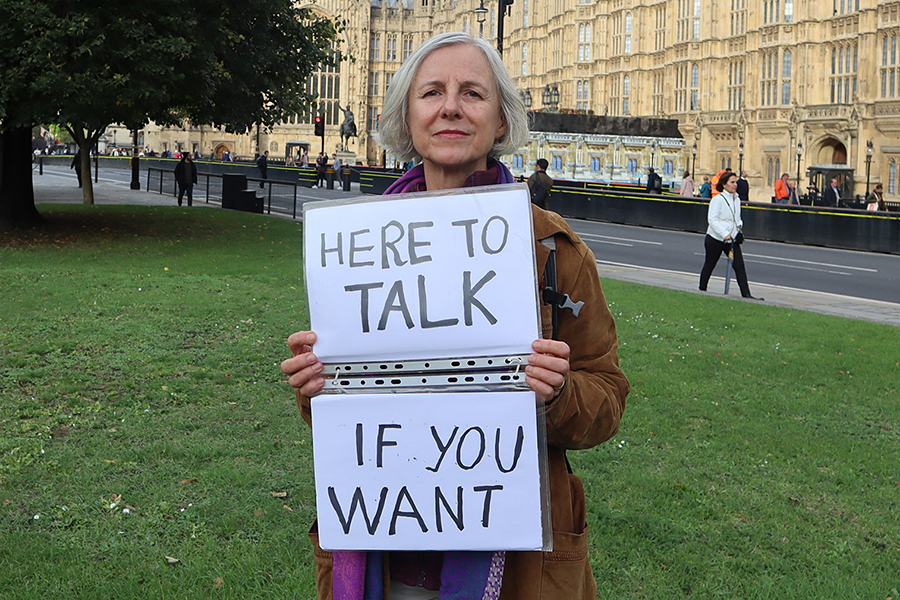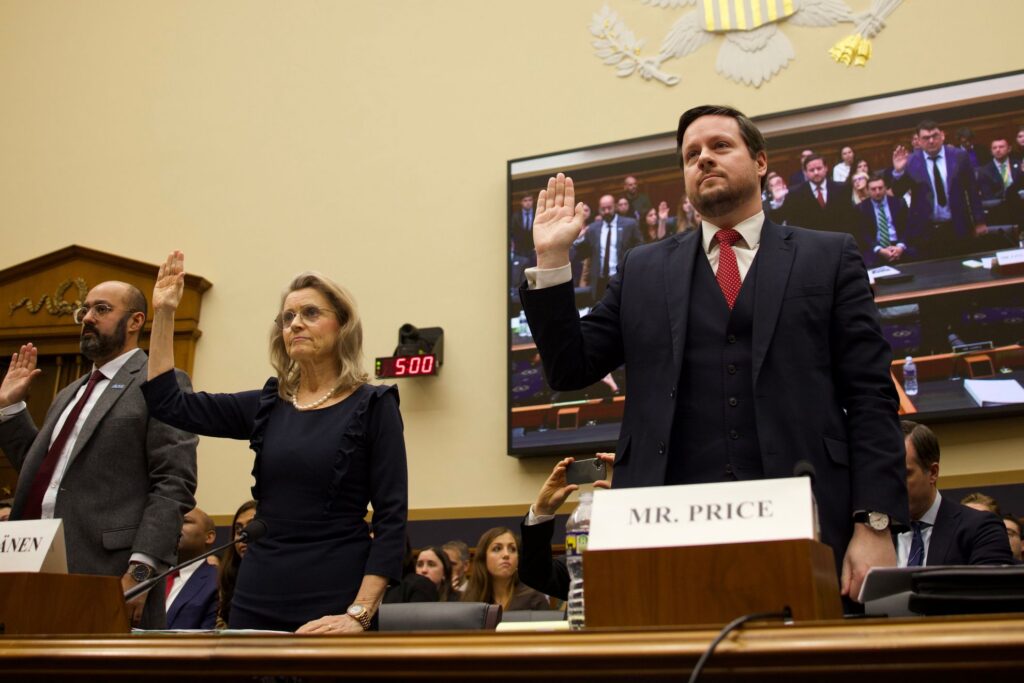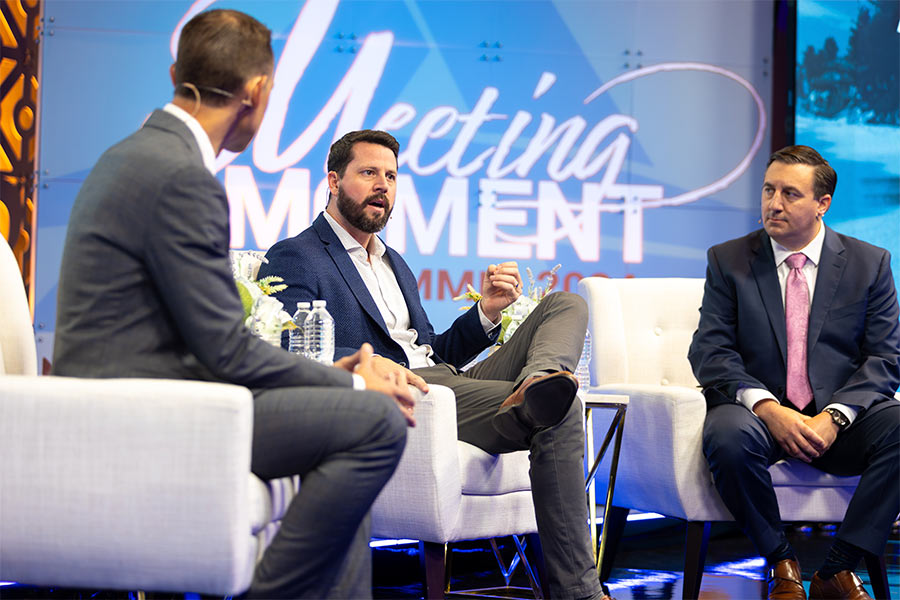
The First Amendment’s guarantee of freedom of speech protects us from censorship of what we want to say, but we don’t often think about how the First Amendment also protects us from being compelled to say something we don’t want to say.
Today, many situations are raising the question of government-compelled speech: should teachers and professors be compelled to use pronouns contrary to someone’s biology and affirm views about human nature, reality, and gender identity that contradict their beliefs? Should artists be compelled to create art that violates their deeply held convictions? Should pro-life hospitals, doctors, or pregnancy centers be forced to advertise for abortion? Although these situations look very different on the surface, what they have in common is compelled speech.
Alliance Defending Freedom has litigated or supported numerous cases, including several at the Supreme Court, taking on compelled speech. And thankfully, the Court has affirmed multiple times that compelled speech is unconstitutional.
Compelling people to speak messages against their most deeply held beliefs undermines the common good. A free society depends on ordinary citizens having the freedom of belief as well as the freedom to choose what you say and what you don’t say.
What is compelled speech?
Compelled speech occurs when the government forces you to articulate, advocate, promote, communicate, or otherwise express messages or beliefs you do not want to. In other words, compelled speech occurs when the government threatens or punishes you for not speaking.
Compelled speech violates the freedom of conscience
Compelled speech requires someone to say something that they do not want to say. Not only is this a violation of an individual’s right to free speech; it is also a violation of their right to act according to their own conscience.
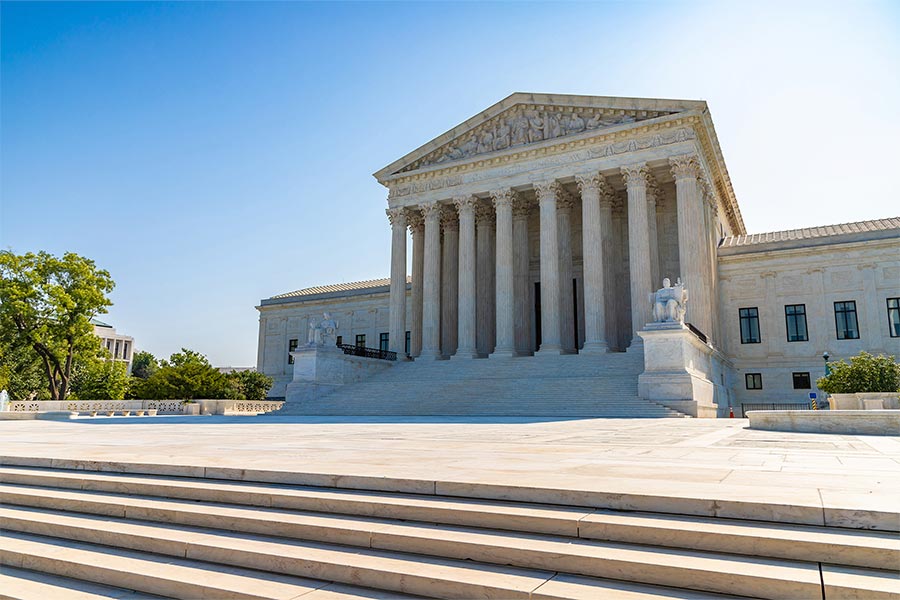
The Supreme Court and compelled speech
Throughout our nation’s history, we have been forced to ask the question, “Can the government compel someone to say something they don’t want to say?” With few exceptions, the Supreme Court has held that the First Amendment protects a person’s ability to not speak messages they disagree with.
West Virginia State Board of Education v. Barnette (1943)
During World War II, the West Virginia Board of Education required students and teachers at public schools to salute and pledge allegiance to the American flag. The children of one family were Jehovah’s Witnesses and refused to comply because they believed the Bible forbid such acts. The children were expelled and threatened with reform school for criminal children, and their parents faced prosecution for causing juvenile delinquency.
In a 6-3 decision, the Supreme Court upheld the First Amendment rights of the children and parents, overruling its decision three years earlier in a nearly identical situation (Minersville School District v. Gobitis). Writing for the majority, Justice Robert H. Jackson wrote, “If there is any fixed star in our constitutional constellation, it is that no official, high or petty, can prescribe what shall be orthodox in politics, nationalism, religion, or other matters of opinion, or force citizens to confess by word or act their faith therein.”
Wooley v. Maynard (1977)
A Jehovah’s Witness named George Maynard challenged a New Hampshire law that required its license plates to bear the state motto, “Live Free or Die.” In accordance with his religious and political beliefs, Maynard had covered the words of the motto on his license plate. For that, he was fined and sentenced to jail.
The Supreme Court ruled 6-3 in Maynard’s favor, holding that New Hampshire could not require a person to “use their private property as a ‘mobile billboard’ for the State’s ideological message.” Chief Justice Warren Burger wrote, “The right to speak and the right to refrain from speaking are complementary components of the broader concept of ‘individual freedom of mind.’”
Hurley v. Irish-American Gay, Lesbian, and Bisexual Group of Boston (1995)
In one of the first Supreme Court victories ADF helped support, the Court ruled unanimously that the government may not misuse an anti-discrimination law to compel speakers to endorse certain messages. The Court held that the veterans’ group organizing a St. Patrick’s Day parade had the autonomy to choose the message conveyed by its parade and could not be compelled to include among its marchers an LGBT group imparting a message the organizers did not wish to convey. To compel them to do so would force the parade organizers to alter the expressive content of their parade. ADF provided funding for the veterans’ appeal to the Supreme Court.
Board of Regents of the University of Wisconsin System v. Southworth (2000)
Scott Southworth, a student at the University of Wisconsin, objected to being compelled to pay student fees that only went to support organizations he disagreed with. When school officials refused his request to opt out of paying the fee, Scott sued the university. In a victory for free speech on college campuses, the Supreme Court ruled unanimously that public universities must allocate student fee funding in a viewpoint-neutral fashion if they choose to make paying the fee mandatory. Otherwise, they would be compelling students’ speech by forcing them to pay into a discriminatory system. This opened the door for Christian student groups nationwide to seek funding for their events on an equal basis with other student groups. ADF funded the litigation expenses from the beginning of this case all the way through its time at the Supreme Court.
National Institute of Family and Life Advocates v. Becerra (2018)
ADF represented the National Institute of Family and Life Advocates (NIFLA) at the Supreme Court against the state of California. California’s so-called Reproductive FACT Act compelled pro-life pregnancy care centers to post a conspicuous sign in their waiting rooms saying that California provides free or low-cost abortion, and providing a number to call for abortion referrals. The law also forced non-medical pregnancy centers to add large disclosures about their non-medical status in all advertisements, wrongly implying that they were unqualified to provide services.
The Supreme Court rejected California’s law, ruling that the government cannot compel pro-life groups and individuals to express a message that conflicts with their beliefs. Justice Clarence Thomas wrote in the majority opinion that “people lose when the government is the one deciding which ideas should prevail.” Justice Anthony Kennedy likewise wrote in a concurring opinion, “Governments must not be allowed to force persons to express a message contrary to their deepest convictions.”
Janus v. AFSCME (2018)
Mark Janus was an Illinois state employee who was forced by Illinois law to have a chunk of his paycheck go to pay the American Federation of State, County and Municipal Employees (AFSCME). However, he was not a member of AFSCME and disagreed with some of its political stances. The Supreme Court ruled that the practice of requiring non-members to pay agency fees to the union is unconstitutional.
Writing for the majority, Justice Samuel Alito wrote that the practice of compelling speech violates the freedom of conscience. “When speech is compelled,” he wrote, “individuals are coerced into betraying their convictions. Forcing free and independent individuals to endorse ideas they find objectionable is always demeaning.”
Masterpiece Cakeshop v. Colorado Civil Rights Commission (2018)
ADF client Jack Phillips is a cake artist who was punished by the Colorado Civil Rights Commission for declining to design a custom wedding cake celebrating a same-sex marriage due to his religious beliefs about marriage. ADF represented Jack at the Supreme Court, arguing that the government cannot compel artists to celebrate events or express ideas that they do not support.
In a 7-2 ruling, the Court found that Colorado was wrong to punish Jack for peacefully living out his beliefs in the marketplace, citing the Commission’s double standard toward Jack and its hostility toward his religious beliefs. However, because the free exercise violation was so clear, the Court did not address the free speech violation in Jack’s case.
303 Creative v. Elenis (2023)
Lorie Smith is a graphic artist and website designer who runs her own design studio, 303 Creative. She started 303 Creative to create unique websites promoting messages and causes close to her heart, such as supporting children with disabilities and veterans. She also wanted to design custom websites celebrating weddings between a man and a woman. But she refrained on the last item.
Lorie saw how Colorado had used its public-accommodation law to target Jack Phillips and try to compel his speech, and she feared that the same thing could happen to her. Like Jack, Lorie serves all people, including those who identify as LGBT. Like most artists, however, she can’t create every message requested of her.
In 2016, Lorie filed a pre-enforcement challenge against Colorado’s law to protect her right to free speech. Even though the state of Colorado agreed that Lorie serves all customers (a fact stipulated by all parties in court), the state still argued it had a right to compel her speech.
In June 2023, the Supreme Court ruled 6-3 in favor of Lorie, upholding the free speech rights of all Americans. As Justice Gorsuch wrote in the Supreme Court’s decision, “[A]s this Court has long held, the opportunity to think for ourselves and to express those thoughts freely is among our most cherished liberties and part of what keeps our Republic strong … [T]olerance, not coercion, is our Nation’s answer. The First Amendment envisions the United States as a rich and complex place where all persons are free to think and speak as they wish, not as the government demands.”
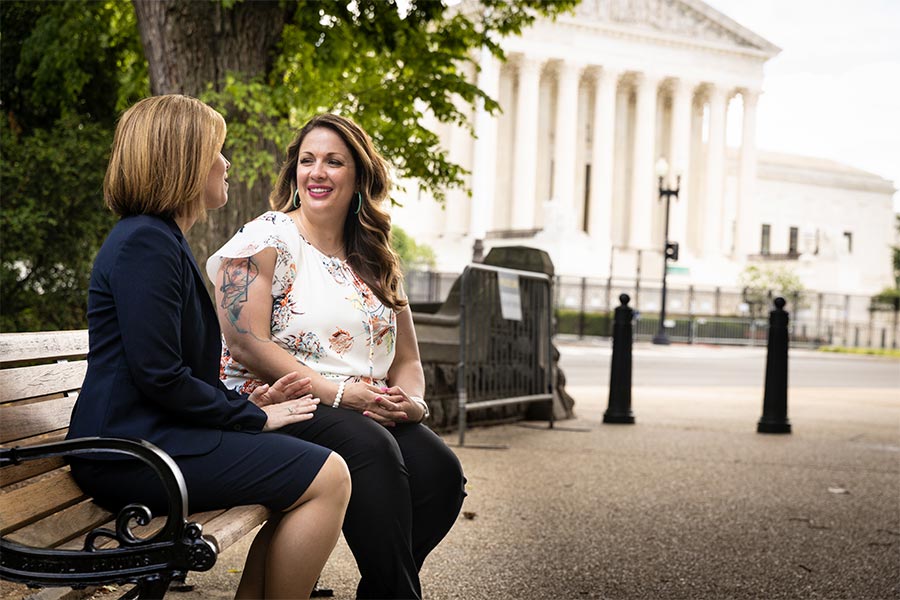
How does compelled speech affect me?
There are many areas of life where questions of compelled speech are coming to the surface. And ADF is taking a stand to ensure that all Americans have the right to speak (or not speak) freely.
Preferred pronouns
One recent manifestation of compelled speech has been the mandatory use of pronouns contrary to someone’s biological sex, especially in education. Public school boards and universities are increasingly adopting policies that force teachers, professors, other education officials, and even students to use pronouns that are inconsistent with the student’s sex if the student requests this—even if this violates the speaker’s deeply held religious or personal convictions about the nature of gender and sexuality.
Peter Vlaming, a high school teacher in Virginia, was fired because he declined to use male pronouns for a female student. ADF represented him at the Virginia Supreme Court in November 2022.
Another teacher, Tanner Cross, was suspended from his job after voicing his opposition to a pronoun policy at a Loudoun County School Board meeting. ADF represented Tanner, and the Virginia Supreme Court vindicated his right to voice his concerns. Now, two additional teachers (Monica Gill and Kim Wright) have joined Tanner to fight the school board’s unconstitutional pronoun policy.
Compelled speech has shown up in higher education, as well.
In 2021, ADF secured a victory at the U.S. Court of Appeals for the 6th Circuit for Dr. Nicholas Meriwether, a philosophy professor at Shawnee State University in Ohio. He had been charged by the university with discrimination and creating a hostile environment against a male student who demanded to be referred to with female titles and pronouns.
Dr. Meriwether was threatened with “further corrective actions” if he did not either refer to students using pronouns that reflect their self-asserted gender identity or stop using pronouns altogether for all students. Thankfully, the 6th Circuit ruled that this compelled speech was a clear violation of Dr. Meriwether’s First Amendment right to free speech.
If the government can compel this kind of speech, then it can compel just about any other kind of speech.
Artists and compelled speech
Artists express their thoughts and beliefs through custom creations. Photographers, calligraphers, graphic designers, filmmakers, custom print shops, floral artists, and cake artists all speak through the custom art that they design. Yet, all too often, the government is using its power to try to compel these artists to create art—and express messages—that violate their deeply held convictions.
Thankfully, the 303 Creative v. Elenis decision mentioned above reaffirmed the enduring precedent of the First Amendment that protects the free speech rights of all Americans, including those who create speech for a living.
In ongoing cases involving photographers and bloggers Chelsey Nelson and Emilee Carpenter and cake artist Jack Phillips (who is in his third lawsuit), ADF has updated those courts about how the 303 Creative ruling supports the freedom of expression for these ADF clients too.
The government shouldn’t deny free speech rights to Americans who create art for a living.
Pro-life pregnancy centers
Pregnancy centers have also been targeted by laws that compel their speech, with governments trying to force pregnancy centers to advertise for abortion, the very thing they oppose.
Some of these laws have also attempted to compel pregnancy centers to put up disclaimers about their staff or services—a ploy by pro-abortion activists to dissuade women from seeking help from these centers. The NIFLA case at the Supreme Court was one such case, but ADF has won other similar cases in Hawaii, Connecticut, and New York as well.
College students’ rights
Students at colleges and universities can also be the targets of compelled speech. The Southworth case was one such example where student fees were mandated but weren’t distributed in a viewpoint-neutral fashion. Additionally, some professors have attempted to use their power to give students “assignments” that essentially turn the student into the professor’s private lobbyist or community activist.
One such student represented by ADF was Emily Brooker, a master’s student in social work at Missouri State University. One of her professors told the class that, as part of an assignment, they had to sign a letter to the Missouri legislature advocating same-sex adoption. Emily asked for an alternate assignment. At first, the professor agreed, but a few days later, the professor charged her with a level three grievance, the highest form of punishment at the School of Social Work.
Emily reached out to an ADF allied attorney, and within about two weeks, the school settled with ADF and Emily in her favor. The university even ended up hiring outside investigators to examine the School of Social Work.
Conclusion
As our society has become increasingly intolerant of ideas it disagrees with, so too has our government failed in its obligation to protect everyone’s free speech and is instead compelling citizens to articulate only the government’s preferred messages. But compelling people to speak messages they disagree with is antithetical to our Constitution’s protection of free speech. The government cannot force us to say things we do not want to say—especially things that violate our deepest beliefs. We must remember that a free society requires the respect of people’s freedom of conscience and their ability to say—or not say—what is on their mind.

-150x150.jpg)
-1024x1024.jpg)

